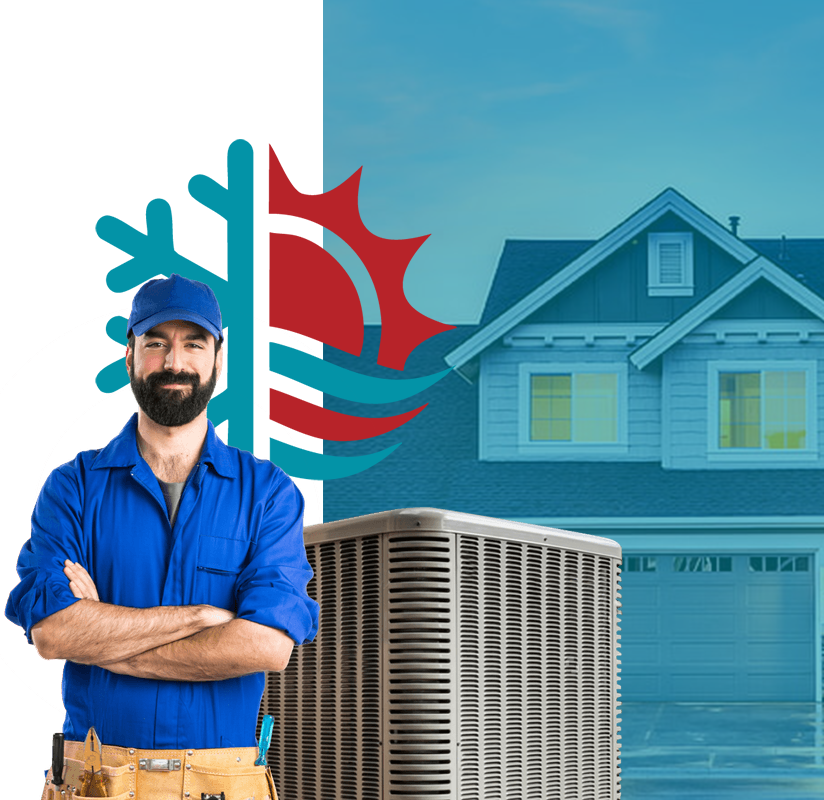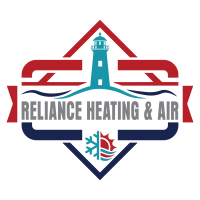AC Repair
Reliance Heating & Air is your trusted choice for residential AC repair on the Mississippi Gulf Coast. Our skilled technicians quickly diagnose and fix issues to keep your home cool and comfortable, even during peak heat and humidity. We handle everything from minor maintenance to major repairs with prompt, reliable service. With honest pricing and expert care, we make it easy to stay cool without the stress. – Leave the ‘schedule a service’ button

Common AC Problems and Causes
Common AC problems can range from inadequate cooling and unusual noises to frequent cycling or refrigerant leaks. These issues often stem from causes such as dirty air filters, refrigerant leaks, electrical problems, thermostat malfunctions, or general wear and tear on components, emphasizing the importance of regular maintenance and prompt professional inspection to prevent costly repairs.
Not Cooling
Several factors can cause an AC unit to not cool properly, including low refrigerant levels, dirty or clogged filters, a malfunctioning thermostat, or a faulty compressor. These issues can impede the system’s ability to effectively cool the air and may require professional inspection and repair to restore optimal cooling performance.
Dirty Filters
Dirty filters in an AC system restrict airflow, making it harder for the unit to pull in warm air and cool it effectively, ultimately leading to reduced cooling efficiency and potential system malfunctions.
Refrigerant
Low refrigerant levels in an AC system can lead to cooling problems because refrigerant is responsible for absorbing heat from indoor air. When levels are insufficient, the AC unit struggles to remove heat effectively, resulting in reduced cooling capacity and potentially causing the system to run inefficiently or not cool at all.
Sensor Problems
Sensor problems in an AC system can contribute to cooling issues by causing inaccurate temperature readings, leading to erratic or inadequate cooling, as the system may not respond correctly to the actual indoor temperature, resulting in discomfort and inefficiency.

Thermostat Issues
Thermostat issues can lead to AC problems by causing inaccurate temperature readings, which in turn may result in the AC system not cooling or cooling excessively, leading to discomfort and potentially higher energy bills.

Drainage Problems
Drainage problems, such as clogged condensate drains or improper sloping of the condensate line, can lead to AC issues by preventing the effective removal of moisture from the system. This can result in reduced cooling efficiency, decreased indoor comfort, and even potential damage to the AC unit due to excessive moisture buildup.
Not Turning On
When the sweltering heat of summer bears down and your home’s comfort depends on the steady hum of your air conditioning system, there are few things more frustrating than an AC unit that refuses to spring to life. A malfunctioning AC system not turning on is a common issue that can leave you hot, bothered, and in need of a solution. There are various culprits responsible for this problem, ranging from electrical issues to thermostat malfunctions, refrigerant problems, and more.
Dirty Filters
Dirty filters in an AC system restrict airflow, making it harder for the unit to pull in warm air and cool it effectively, ultimately leading to reduced cooling efficiency and potential system malfunctions.
Refrigerant
Low refrigerant levels in an AC system can lead to cooling problems because refrigerant is responsible for absorbing heat from indoor air. When levels are insufficient, the AC unit struggles to remove heat effectively, resulting in reduced cooling capacity and potentially causing the system to run inefficiently or not cool at all.
Sensor Problems
Sensor problems in an AC system can contribute to cooling issues by causing inaccurate temperature readings, leading to erratic or inadequate cooling, as the system may not respond correctly to the actual indoor temperature, resulting in discomfort and inefficiency.

Thermostat Issues
Thermostat issues can lead to AC problems by causing inaccurate temperature readings, which in turn may result in the AC system not cooling or cooling excessively, leading to discomfort and potentially higher energy bills.

Drainage Problems
Drainage problems, such as clogged condensate drains or improper sloping of the condensate line, can lead to AC issues by preventing the effective removal of moisture from the system. This can result in reduced cooling efficiency, decreased indoor comfort, and even potential damage to the AC unit due to excessive moisture buildup.
Sensor Problems
Sensor problems in an AC system can contribute to cooling issues by causing inaccurate temperature readings, leading to erratic or inadequate cooling, as the system may not respond correctly to the actual indoor temperature, resulting in discomfort and inefficiency.
Airflow is Limited
Proper airflow is a fundamental aspect of any efficient and effective air conditioning system. When airflow is limited, it can lead to a range of common problems that not only compromise the comfort of your indoor space but can also impact the overall performance and longevity of your AC unit. Whether it’s due to clogged filters, obstructed ducts, or issues with the blower motor, understanding the factors that restrict airflow is essential for maintaining a cool and comfortable environment in your home or office.
Dirty Filters
Dirty filters in an AC system restrict airflow, making it harder for the unit to pull in warm air and cool it effectively, ultimately leading to reduced cooling efficiency and potential system malfunctions.
Refrigerant
Low refrigerant levels in an AC system can lead to cooling problems because refrigerant is responsible for absorbing heat from indoor air. When levels are insufficient, the AC unit struggles to remove heat effectively, resulting in reduced cooling capacity and potentially causing the system to run inefficiently or not cool at all.
Sensor Problems
Sensor problems in an AC system can contribute to cooling issues by causing inaccurate temperature readings, leading to erratic or inadequate cooling, as the system may not respond correctly to the actual indoor temperature, resulting in discomfort and inefficiency.

Thermostat Issues
Thermostat issues can lead to AC problems by causing inaccurate temperature readings, which in turn may result in the AC system not cooling or cooling excessively, leading to discomfort and potentially higher energy bills.

Drainage Problems
Drainage problems, such as clogged condensate drains or improper sloping of the condensate line, can lead to AC issues by preventing the effective removal of moisture from the system. This can result in reduced cooling efficiency, decreased indoor comfort, and even potential damage to the AC unit due to excessive moisture buildup.
Sensor Problems
Sensor problems in an AC system can contribute to cooling issues by causing inaccurate temperature readings, leading to erratic or inadequate cooling, as the system may not respond correctly to the actual indoor temperature, resulting in discomfort and inefficiency.

Age of the unit
As your AC unit edges toward 12 years old, it is likely reaching the end of its lifespan.

Energy Efficiency
Once units reach 10 years of age, they should be considered a candidate for replacement, based on energy savings alone.

Repair Frequency
Are you really saving money if you’re constantly doing repairs? Let one of our technicians give you an accurate price estimate so you can compare.
Repairing Your Air Conditioner Enough?
While air conditioning repair can be a crucial step in addressing immediate issues with your AC system, it may not always be enough in some cases. The adequacy of repair depends on the severity and complexity of the problem, as well as the age and condition of your AC unit.
For minor issues like a clogged filter or a malfunctioning thermostat, repair might be sufficient to restore proper functioning. However, in situations where the AC system is older, has frequent breakdowns, or experiences major component failures such as the compressor or condenser coil, repair may not be cost-effective or a long-term solution. In such cases, it might be more prudent to consider AC replacement, as investing in a new, energy-efficient system can often provide better performance, lower operating costs, and greater reliability in the long run.
Ultimately, the decision between repair and replacement should be made in consultation with a professional HVAC technician who can assess the condition of your AC unit and provide recommendations based on your specific circumstances and budget.
Why You Should Contact Us For Your AC Repair’
Contacting Reliance Heating and Air for your AC repair needs is a smart choice for several compelling reasons. With our extensive experience in the MS Gulf Coast climate, we understand the urgency of having a functional AC system, especially during scorching summers. Our team of skilled technicians is not only trained but also well-equipped to diagnose and address a wide range of AC issues promptly and efficiently, ensuring your indoor comfort is swiftly restored. We prioritize transparency and affordability, offering fair, upfront pricing and honest assessments of your AC system’s condition, so you can make informed decisions. Moreover, our commitment to energy efficiency means that our repairs not only fix immediate problems but also optimize your system’s performance, potentially saving you money on energy bills. When you choose Reliance Heating and Air for AC repair, you’re choosing reliable expertise, prompt service, and lasting comfort for your MS Gulf Coast home.




